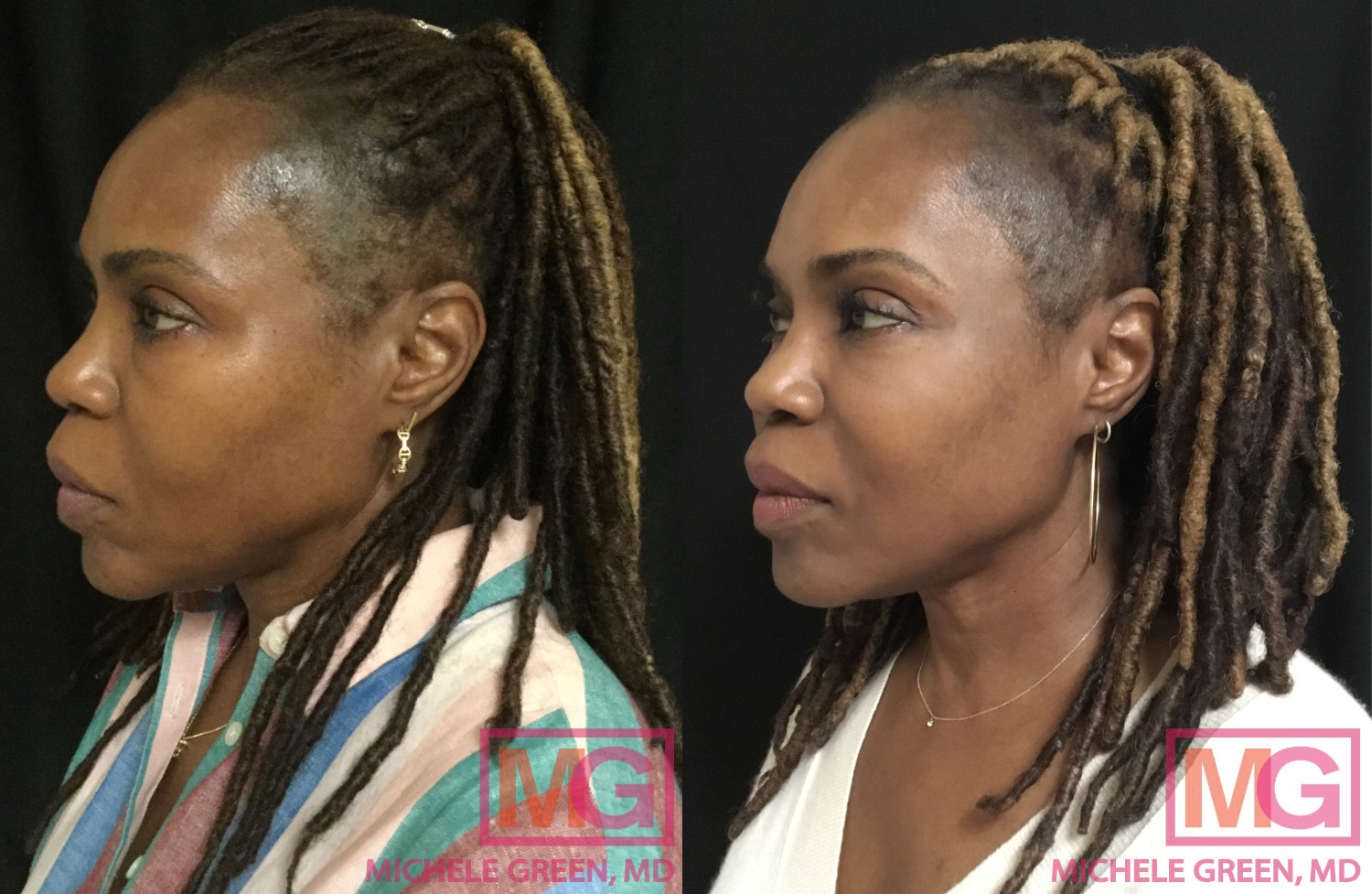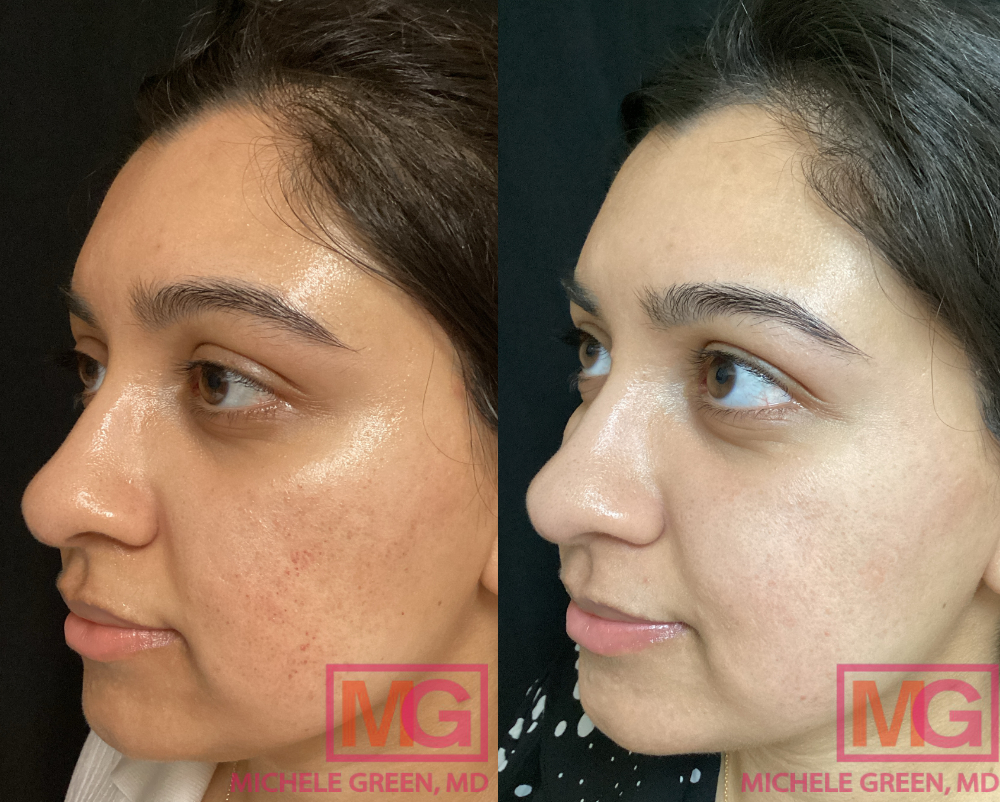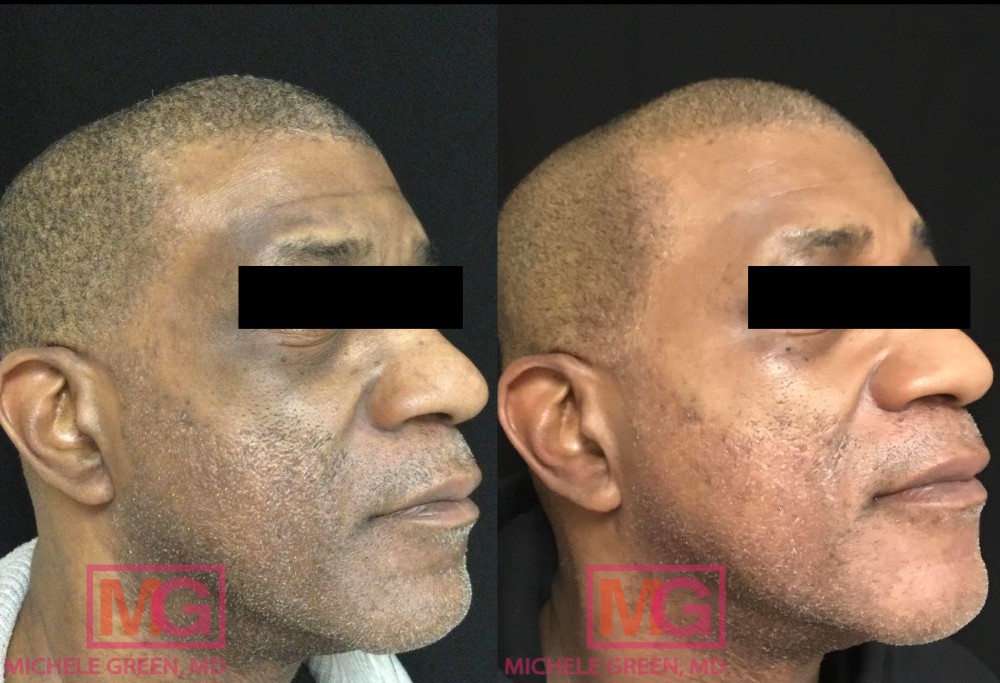Laser Treatment for Darker Skin Tones
Laser treatments can help with a variety of skin conditions, from sun damage in the form of sun spots and age spots, hyperpigmentation, melasma, uneven skin tone and texture, fine lines, wrinkles, acne scars, hair removal, and large pores. However, not all laser therapies or treatment options are safe for patients of all skin types. In fact, patients with darker skin types are at a much higher risk of post-inflammatory hyperpigmentation, hypopigmentation, burning, and scarring if the wrong type of laser technology is used. That said, several treatment options are safe and effective for patients of color, providing all of the skin rejuvenation benefits without the high risk of permanent skin damage. That is why patients with skin of color need to seek treatment from an expert board-certified dermatologist, such as Dr. Michele Green in New York City, who has over 25 years of experience treating patients of all skin types and ethnicities.
Many laser treatments were originally developed for use on patients with lighter skin and are designed to target the melanin in the skin or hair follicle in the treatment area. Melanin is the naturally occurring pigment in the body that gives the skin and hair their color. People of color have a higher concentration of melanin in the skin, meaning that laser treatments designed to target melanin can damage already melanin-rich skin. At Dr. Green’s New York City dermatology office, many laser treatment options are available that are safe and effective for ethnic skin, including the eMatrix laser for reducing the appearance of acne scars and improving skin tone and texture, the Thermage radiofrequency laser for skin tightening, the Clear + Brilliant fractionated laser for eliminating sun damage, fine lines, and acne scars, and the Candela GentleYAG nd: YAG laser for hair removal. When you have your initial consultation with Dr. Green, she will take into account your aesthetic goals and skin type to develop a treatment plan that will be safe and effective for you.
Michele Green, MD, FAAD in New York City, is a cosmetic board-certified dermatologist with a wealth of experience treating patients of different ethnicities, male and female, at her private office in the Upper East Side Neighborhood of New York City. Dr. Green uses the latest technology in dermatology treatments, including chemical peels, Microneedling, Botox, Cosmelan, and laser skin treatments, to find the best solution for patients with any skin tone. From skin cancer to hair loss, ethnic skin needs special care and thoughtful consideration, and Dr. Green always prioritizes customizing patient treatment plans to cater to their unique needs. Well-versed in a wide range of cosmetic procedures and known for high patient satisfaction, Dr. Green has been consistently voted one of the best dermatologists by such publications as Castle Connolly, Super Doctors, and New York Magazine.

What is laser skin resurfacing?
Laser skin resurfacing is a cosmetic procedure in which laser technology stimulates skin cell turnover and boosts collagen production, resulting in clearer, smoother, tighter skin. With laser resurfacing, patients can reduce the appearance of fine lines and wrinkles, eliminate discoloration on the skin’s surface, and remove acne scars. Two over-arching types of resurfacing lasers exist: ablative lasers and non-ablative lasers, which provide similar results but differ in their method of action. Ablative lasers remove the outer layer of the skin, known as the epidermis, which stimulates skin cell turnover and collagen production for smoother, clearer skin. Ablative lasers provide patients with more dramatic effects, but there is more significant downtime associated with ablative laser treatment and a higher risk of side effects. Non-ablative laser treatment does not remove the outer layer of skin. Rather, non-ablative lasers emit precise beams of laser energy to create targeted damage to the inner layer of the skin (the dermis). The controlled damage triggers the body’s natural collagen production for smoother, firmer, more evenly toned skin. Depending on the wavelength of light employed by the laser technology, the treatment can target different depths and different cosmetic concerns, ranging from fine lines and wrinkles to pigmentation to acne scars to large pores.
Does laser treatment work on dark skin tones?
Many patients wonder, “Does laser work on dark skin?” and the answer is that while laser therapy can be an effective treatment for patients of color, it is essential to choose a type of laser that will not damage dark skin. In the world of dermatology, the Fitzpatrick scale was created to determine the skin type of patients and whether certain laser therapies would be safe for use on the skin. The Fitzpatrick skin types range from I, which is the fairest skin and most likely to burn in the sun, to VI, which is black or brown skin that tans easily and does not burn in the sun. Patients with Fitzpatrick skin types III-VI have more melanin present in the skin, meaning that certain lasers that are meant to target melanin, such as Intense Pulsed Light (IPL) treatment, can cause lasting damage to melanated skin. When looking to get laser treatment, it is essential to choose a dermatologist with experience working with patients of many different skin types, such as Dr. Michele Green, who can advise patients on the type of laser treatment that will address skin concerns while leaving the surrounding skin unaffected.
Is laser resurfacing safe for dark skin?
Different Fitzpatrick skin types require different treatment options to address skin concerns while avoiding skin damage. Many lasers that became available in the 1990s were designed specifically for patients with lighter skin types. These lasers could address hyperpigmentation and age spots in the skin by targeting the melanin-rich pigmentation and leaving the surrounding skin unharmed. This principle does not work for darker skin that is already rich in melanin to begin with. Inexperienced, ill-informed laser therapy practitioners may use the same lasers on all skin types, which can be harmful to people of color, who are at a higher risk of developing post-inflammatory hyperpigmentation, laser burn, hyperpigmentation, and keloid scarring. In terms of the safety of patients with darker skin, it is essential to avoid lasers such as the Fraxel laser, Picosure laser, Erbium laser, CO2 laser, and most fractionated lasers. To find out which laser treatments will be safe and effective for darker skin, schedule an initial consultation with experienced board-certified dermatologist Dr. Michele Green.
Is laser hair removal safe for darker skin tones?
Traditional lasers for hair removal, such as Intense Pulsed Light (IPL) therapy, target the melanin present in the hair follicle to destroy the follicle and stop new hair growth. The laser energy emitted is absorbed by the melanin in the hair follicle, which is converted to heat energy and destroys the hair growing in the treatment area. However, this method of hair removal only works when there is a contrast between the patient’s skin color and hair color, meaning that patients with dark skin can experience serious side effects, such as laser burn if this type of laser hair removal is employed.
Laser hair removal is safe and possible for patients with darker skin tones, thanks to the Nd: YAG laser, known as the Candela GentleYAG laser. The Candela GentleYAG laser targets the hair follicle with a long wavelength of laser energy at 1064 nm that penetrates deeper than other types of laser. With deeper penetration depth, the GentleYAG laser bypasses the melanin at the skin’s surface and is able to target the hair follicle at the root. The Candela GentleYAG is specifically designed for patients with darker skin, making it a safe and effective alternative to traditional laser hair removal methods, destroying the hair follicles at the treatment site while leaving the surrounding skin unharmed.
How does laser burn dark skin?
Patients often wonder, “Why does laser burn dark skin?” and the answer is that many laser treatment options will remove hair or eliminate areas of hyperpigmentation by targeting the melanin in the hair follicle or skin. Patients with dark skin, however, already have high levels of melanin present in the surrounding skin, meaning when lasers are applied to darker skin types, the laser energy may be absorbed by the surrounding skin, leading to burns and scarring. Patients who experience laser burn will often experience the symptoms immediately after the procedure that may worsen in the hours or days after. Laser burn symptoms can include peeling, crusting, hyperpigmentation, and changing skin color. Patients who experience laser burns at institutions such as MedSpas will often come to Dr. Michele Green in NYC for care. Dr. Green often recommends gentle skincare following the burn and notes that patients should be sure to apply sunscreen to avoid direct sunlight, as burns are especially sensitive to the sun. Depending on the degree of hyperpigmentation, special creams, chemical peels, or microneedling with depigmentation serums can be performed.

What skincare is safe for dark skin with hyperpigmentation?
Skin of color is particularly prone to hyperpigmentation due to the already high activity of melanin-producing cells called melanocytes. Patients with Fitzpatrick skin types IV-VI are less likely to experience sunburns. However, unprotected exposure to the sun can still lead to the appearance of sun spots and areas of hyperpigmentation on the skin’s surface. That is why, even if you do not burn in the sun, Dr. Green still recommends the application of a sunscreen of SPF 30 or higher with broad-spectrum protection. In addition to the daily application of sunscreen, Dr. Green recommends the use of a gentle cleanser and moisturizer to keep the skin clear and hydrated. Suppose patients with darker skin tones are experiencing sun damage and uneven complexion. In that case, Dr. Green recommends the use of a vitamin C serum to help repair damage and prevent signs of the natural aging process.
What type of laser is good for dark skin?
Several types of lasers are safe and effective for dark skin. Depending on your aesthetic goals, Dr. Green will turn to a different type of laser:
Patients experiencing loose, sagging skin or uneven skin texture can turn to Thermage FLX for skin tightening and lifting. Often considered the gold standard for skin tightening, Thermage uses radiofrequency laser energy to penetrate the deeper layers of skin, triggering collagen production for firmer, tighter skin. Thermage can be used across many areas of the body, including the face, neck, chest, arms, legs, and buttocks.
Patients experiencing sun damage, fine lines, acne scars, melasma, uneven skin texture, or large pores can turn to the Clear + Brilliant fractionated laser, which is safe and effective for all skin types. The Clear + Brilliant laser, often referred to as the “Mini Fraxel” laser, uses fractional laser energy to create targeted micro-injuries to boost collagen production.
Patients looking for a laser resurfacing option to address acne scars, uneven skin texture, pigmentation, stretch marks, and wrinkles can turn to the eMatrix laser. Using radiofrequency laser energy, the eMatrix laser heats the inner layer of skin while keeping the surrounding skin cool and unaffected. After a series of treatments, the eMatrix laser provides patients with smooth, clear, rejuvenated skin.
Patients searching for a safe and effective laser hair removal option can turn to the Candela GentleYAG laser, which is a non-ablative single-phase laser that penetrates deeper than traditional laser hair removal treatments to protect the skin’s surface. Emitting a long wavelength of 1064 nm, the Candela GentleYAG laser targets the melanin in the hair follicle, where it is absorbed and transformed into heat energy, which destroys the follicle without damaging the surrounding skin.

Which laser for pigmentation for dark skin?
Many patients wonder, “What is the best laser treatment for dark skin pigmentation?” The answer is that Dr. Green most frequently turns to the Clear + Brilliant laser to address sun spots for patients with darker skin. The Clear + Brilliant laser is FDA-approved to treat a range of skin concerns, including sun spots, age spots, acne scars, and uneven skin texture. Using fractional laser energy that is safe for all skin tones, the Clear + Brilliant laser creates targeted damage to the inner layer of skin to promote skin cell turnover and collagen production. The Clear + Brilliant laser has two wavelength settings, and for treating pigmentation, Dr. Green will use the 1927 nm handpiece. Typically, patients require six treatment sessions to achieve optimal results.
Which laser is best for African American skin?
Expert board-certified dermatologist Dr. Michele Green is highly experienced in treating patients of all skin types and skin tones. The best laser treatment option for Black skin depends on the aesthetic goals of the patient. Patients looking to tighten their skin can turn to the Thermage radiofrequency laser, which is safe for patients of all skin colors and is considered the gold standard for skin tightening. Patients looking for safe and effective laser hair removal can turn to the Candela GentleYAG laser, while patients looking to address areas of hyperpigmentation can turn to the Clear + Brilliant laser. Patients seeking laser treatment should always consult with an experienced board-certified dermatologist, such as Dr. Green, to ensure that they are receiving safe and effective treatment for their skin type.
Does laser resurfacing change skin color?
Patients with darker skin tones are more susceptible to damage by traditional lasers, such as the Fraxel laser, CO2 laser, Picosure laser, and Erbium laser. One of the potential serious side effects of these laser treatments on darker skin is hyperpigmentation or hypopigmentation. Hyperpigmentation occurs when the skin at the treatment area becomes darker, while hypopigmentation is when the skin at the treatment site becomes lighter than the surrounding skin. Both can be painful and distressing for patients, which is why it is essential to seek treatment from a dermatologist who is familiar with safe laser treatments for dark skin, such as Dr. Green.
Who is not a good candidate for laser resurfacing?
Certain types of laser resurfacing treatments can damage skin of color, leading to hyperpigmentation, hypopigmentation, keloid scarring, and burns. However, several types of lasers are safe and effective for patients of all skin tones and skin types, including the eMatrix laser and the Clear + Brilliant laser. To find out which type of laser treatment is safe and effective for you, schedule your initial consultation with expert dermatologist Dr. Michele Green.
Is laser or IPL better for dark skin?
IPL, which is the abbreviation for Intense Pulsed Light therapy, is often traditionally used for laser hair removal. It works by targeting pigmentation in the hair follicle to destroy the hair follicle, preventing new hair growth in the area. However, because IPL targets pigmentation, it can be harmful to patients with darker skin tones, as the beam of light energy can be absorbed by the skin, causing damage to the skin’s surface. As an alternative, Dr. Green will turn to the Candela GentleYAG laser for hair removal for patients with darker skin tones. The Candela GentleYAG laser penetrates deeper into the skin to prevent damage to the skin’s surface while still effectively damaging the hair follicle and preventing new hair growth.
How to get started with laser treatment for dark skin today
Laser treatments can be highly effective for addressing a wide range of cosmetic concerns, including sun spots, age spots, fine lines, wrinkles, uneven skin texture, hair removal, acne scars, and large pores. However, certain types of laser treatments are not safe for patients with dark skin tones and can cause permanent scarring and damage to the skin. Being seen by a provider who is experienced and knowledgeable regarding skincare for people of color helps guarantee the best outcomes for patients with darker skin and enhances the overall patient experience. Finding a dermatologist with experience treating skin concerns for all skin types, whether they be medical skin conditions or cosmetic skin concerns, may feel challenging. Luckily, Dr. Michele Green in New York City is here to help.
Dr. Michele Green is an internationally renowned board-certified dermatologist with over two and a half decades of experience providing her patients with the best non-invasive treatment options. Dr. Green takes a holistic approach and embraces a less-is-more philosophy, creating customized skincare routines and treatment plans that cater to the unique concerns and aesthetic goals of her patients. She is consistently identified as one of New York’s best dermatologists by Castle Connolly, New York Magazine, and Super Doctors for her dedication to her patients and expertise. Please call us at 212-535-3088 or email our New York City-based office today to schedule a consultation with Dr. Michele Green to find out which laser treatment options are safe and effective for you.
 212-535-3088
212-535-3088